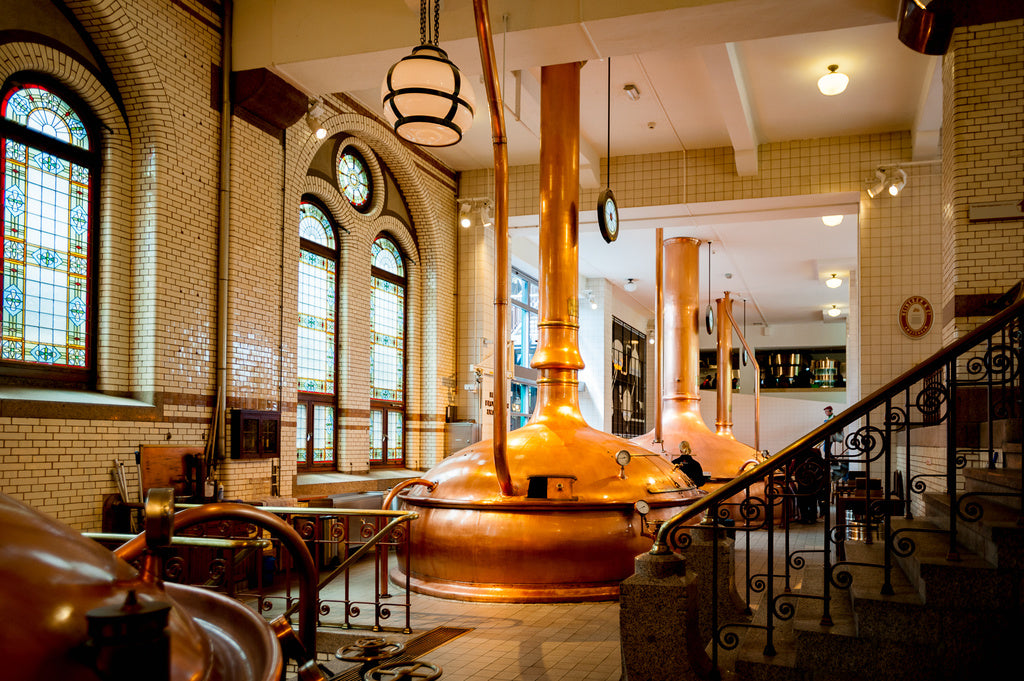
The History of Beer
May 15, 2023
Beer is one of the oldest and most popular alcoholic beverages in the world, with a rich and varied history that stretches back thousands of years. From its earliest origins in ancient civilizations to its current status as a beloved beverage enjoyed by millions, the story of beer is a fascinating one that offers insight into the evolution of human culture and technology.
In today’s article, we’re going to dive deep into the origins and evolution of one of the world's oldest beverages.
The origins of beer
The exact origins of beer are difficult to pinpoint, as the production of fermented beverages predates written history. However, there is evidence to suggest that beer was first brewed in ancient Mesopotamia, which is now modern-day Iraq, over 5,000 years ago. The Sumerians, who inhabited the region from around 4000 BCE, are credited with developing the first known beer recipe, which involved using bread, honey, and dates to ferment malted grains.
As beer-making techniques spread throughout the ancient world, different cultures adapted the recipe to suit their local ingredients and tastes. For example, the Egyptians used barley and flavoured their beer with herbs and spices, while the Greeks and Romans used barley, wheat, and hops to create a more bitter brew.
Beer played an important role in many ancient cultures, and it was often used in religious ceremonies and social gatherings. In ancient Egypt, beer was considered a gift from the gods, and it was often used as a form of payment. The consumption of beer was also a part of daily life, and it was believed to have medicinal properties that could cure a variety of ailments.
As beer-making techniques continued to evolve, new ingredients and fermentation methods were introduced, leading to the development of different styles of beer. For example, the use of hops, which were first introduced in the 9th century, helped to add flavour and aroma to beer and acted as a natural preservative, allowing beer to be stored for longer periods of time.

Beer in the Middle Ages
Now you’re aware of its humble beginnings, it’s time to look at how beer developed during the Middle Ages. Throughout this time period, beer played an important role in serving as a source of sustenance, a safe alternative to water, and a cultural symbol. Interestingly, the production of beer was controlled by monasteries as it was considered a holy task - look how that's changed in today’s society!
The brewing process consisted of using a variety of grains, including barley, wheat, oats, and rye, and it was often flavoured with herbs and spices. Hops were introduced as a bittering agent in the 11th century, which helped to balance the sweetness of the malt and acted as a natural preservative. It was consumed in large quantities during this era and it was a staple of the daily diet for many people, from peasants to nobles. It was seen as a safer alternative to water, which was often contaminated.
As the years progressed, the monastery's control of beer production slowly began to shift to commercial breweries once Taverns were becoming popular. Taverns were often located near markets or town squares and provided a place for people to gather and exchange news and information. As the Middle Ages drew to a close, cities such as Munich in Germany emerged as the new hot spot for commercial breweries. This led to the development of new styles of beer, such as lagers, which were fermented at cooler temperatures and required longer ageing periods.
All in all, throughout the Middle Ages beer took significant steps in multiple cultures across the globe. Without the strides it made during this period - it would not be what it is today.

The Industrial Revolution and beyond
In this next time period, there were significant steps made in the world of beer. Due to many circumstances, beer began to blossom as one of the key components in society across the world. The era we investigate next - is the industrial revolution and beyond.
The Industrial Revolution of the 18th and 19th centuries brought about significant changes in the beer industry. With the introduction of steam power and mass production techniques, there was a rise in factories and mechanization; which meant beer production was much more efficient. Large industrial breweries with steam-powered machinery and bottling lines were established, which were able to produce large quantities of beer quickly.
In the years that followed, industrial breweries grew so much that it made beer a major industry; it drove economic growth and technological innovation. New styles such as pale ale and lager began to emerge and grew exponentially in popularity.
After the Industrial Revolution, beer continued to be a popular beverage worldwide, and advancements in technology and globalization have led to further innovations and changes in the beer industry. In the 20th century, beer became a truly global phenomenon, with breweries popping up in every corner of the world. The rise of multinational corporations such as Anheuser-Busch and Heineken, led to the standardisation of beer styles and the development of new marketing strategies to appeal to a global audience.
Since the turn of the 20th century, beer has become a cultural phenomenon in many countries, with beer festivals, tasting events, and beer-themed travel becoming increasingly popular. It plays an important role in many local and regional economies, with breweries and taprooms providing a gathering place for the community.

Jump forward to today, and beer is an established global powerhouse which is constantly evolving. More and more new and existing brewery companies are developing wider ranges of beer styles that anyone can enjoy. Friendly competition is occurring too, as small breweries are starting to challenge the large corporations by offering something different to their customers on a regular basis. Constant innovation is what is propelling this industry to another level, and it will likely continue in the coming years.
We hope you enjoyed reading our latest article diving into the history of beer. If you’re interested in trying unique and delicious craft beer, find out more information about our different styles and collections - reach out to our experts today.





